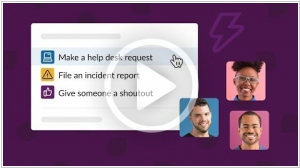Top 10: Workflow Automation software
Updated: August 09, 2023
Workflow automation is the practice of using technology and software to streamline and automate repetitive tasks and processes in a business or organization. It involves designing and implementing automated workflows that can replace manual interventions, reducing human errors, and saving valuable time and resources. Workflow automation can encompass various aspects of business operations, including data entry, document approval, task assignment, and notifications. By eliminating manual steps and automating routine tasks, organizations can improve efficiency, increase productivity, and enhance overall business performance. Additionally, workflow automation allows employees to focus on more strategic and creative tasks that require human expertise, fostering innovation and driving business growth. Embracing workflow automation empowers organizations to optimize processes, ensure consistency, and achieve better outcomes, making it an essential component of modern digital transformation efforts.
Some of the most popular workflow automation software options are listed below.
See also: Top 10 BPM Software
See also: Top 10 BPM Software
2023. AI-based Workflow automation startup Parabola raises $24M
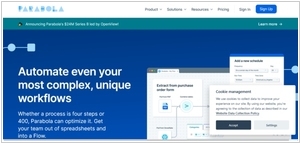
Parabola, a startup that utilizes artificial intelligence to streamline administrative tasks, especially in the logistics and e-commerce industries, has recently announced securing $24 million in a Series B funding round. With the Parabola platform, users can expedite the processing of various types of documents, including PDFs, text message logs, images, and emails. Parabola offers functionalities such as standardizing, enriching, and categorizing these documents. For instance, given a list of product names, Parabola can categorize them based on specific departments like "clothing," "home goods," "grocery," and "electronics." It can also ensure consistency in invoice formats and extract relevant information such as the amount, due date, sender details, and line items, organizing them into a table. Additionally, the platform can analyze Amazon keyword rankings within a specified timeframe, allowing e-commerce teams to optimize their product listings.
2022. Bardeen raises $15.3M for browser-based workflow automation
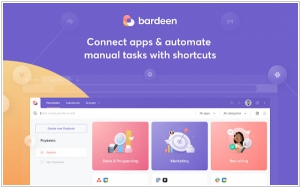
Bardeen, a startup specializing in workflow automation, has successfully raised $15.3 million in funding. The company addresses specific challenges in the realm of automation, with a primary focus on enhancing user experience and facilitating the discovery of automation solutions. Bardeen holds a significant advantage by operating directly within the user's browser, leveraging edge computing for data processing and storage. This approach ensures that all operations take place locally, within the user's browser environment. Additionally, Bardeen incorporates AI modules for tasks such as text-to-speech, optical character recognition, and Smart Suggestions. Smart Suggestions is a distinctive feature that recommends relevant automations to users based on their current context. The company aims to continually improve Smart Suggestions, enabling it to learn and suggest any automation that can effectively save time for the user.
2022. Wrangle secures $2M to automate company workflows
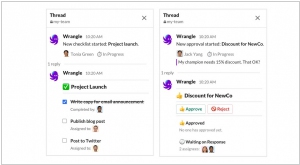
Wrangle has secured $2 million in an oversubscribed pre-seed funding round to further develop its technology. The startup specializes in automating workflows, approvals, and tickets, enabling companies to efficiently track work and provide call-to-action tasks within popular chat platforms like Slack. By integrating operations directly into existing communication tools such as Slack and Microsoft Teams, Wrangle offers organizations a novel approach to managing their workflows. With its no-code software, Wrangle can automate various processes, including employee onboarding, contract approvals, help tickets, and recurring tasks. The platform streamlines requests through forms, assigns and notifies the relevant individuals, and tracks the progress, ensuring transparency and accountability for all involved parties.
2021. n8n raises $12M for its ‘fair code’ approach to low-code workflow automation
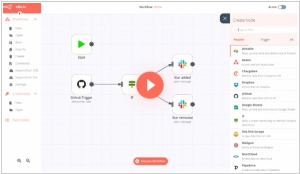
In a Series A funding round, Berlin-based n8n has successfully raised $12 million. n8n offers a comprehensive framework that enables both technical and non-technical individuals to synchronize and integrate data and workflows. Currently, n8n supports the seamless connection and integration of data and functions across more than 200 established applications, as well as any custom apps or services utilized within specific organizations. The aim of n8n is to provide technical superpowers to everyone, empowering teams like marketing or IT to accomplish tasks beyond their traditional capabilities. This includes developing advanced chatbots, creating innovative data visualizations in platforms like Slack, and implementing automation features within products, such as performance monitoring and maintenance alerts.
2021. Zoho launches new low code workflow automation product
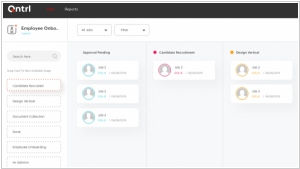
Zoho, a renowned provider of cost-effective business tools, has unveiled a new offering in the form of a low code workflow product named Qntrl (pronounced as "control"). Designed specifically for the mid-market segment, Zoho's Qntrl offers a user-friendly approach to business process management, requiring less technical expertise compared to traditional tools in the market. While connecting workflows to more complex backend systems such as CRM or ERP may necessitate some technical assistance, Qntrl empowers non-technical end users to effortlessly drag and drop components, allowing them to create workflows independently and seek assistance as needed to complete the process effectively. With Qntrl, Zoho continues to cater to the evolving needs of businesses, enabling streamlined workflow management with greater accessibility and ease.
2021. Tines raises $26M for its no-code security automation platform
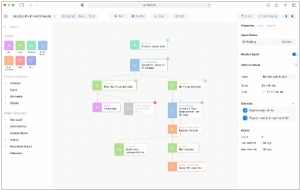
Tines, an automation platform that operates without the need for coding, has successfully secured a Series B funding round of $26 million. Tines is dedicated to empowering frontline employees by enabling them to prioritize essential business tasks and enhance their overall well-being. By automating manual workflows and increasing the efficiency, effectiveness, and engagement of existing teams, Tines aims to alleviate the burden of mundane tasks, commonly known as 'busy work.' The primary objective is to liberate analysts from the time-consuming nature of repetitive responsibilities, allowing them to redirect their efforts towards areas where they can make the most significant impact. Tines offers a wide range of pre-configured integrations with various business and security tools, and advanced users have the flexibility to connect with virtually any API, providing a comprehensive solution for diverse automation needs.
2020. EasySend raises $16M for its no-code approach to automating B2C interfaces

Israeli startup EasySend has secured $16 million in funding for its no-code platform, designed specifically for insurance companies and other regulated businesses. This platform enables the creation of forms and interfaces to collect customer information, which can then be efficiently processed using AI systems. EasySend aims to expand its services into various industries, including telecom carriers and banks. Additionally, the company is considering exploring robotic process automation (RPA) further in the future. While RPA solutions like UIPath, Automation Anywhere, and Blue Prism primarily focus on back-office operations, EasySend's emphasis on the "front office" aligns with leading solutions in that space.
2019. Tray.io brings in $50M for its workflow automation tools
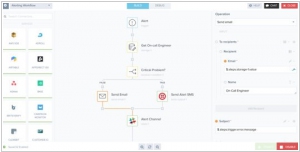
Tray.io, a company that has developed a versatile workflow automation platform, has successfully raised $50 million in funding. The platform utilizes a user-friendly graphical interface, empowering individuals to integrate APIs between multiple applications and create innovative ways of working with data across them. Tray.io initially began with a limited number of integrations, primarily focused on email-related functionalities. For instance, users could import data from Mailchimp into Slack to track email marketing campaigns. However, the company has expanded its offerings significantly and now provides integrations for approximately 400 applications. Tray.io serves a wide range of customers, from small startups to industry giants like IBM, and continues to experience growth in its user base.
2019. Slack adds workflow automation feature
Slack has introduced Workflow Builder, a visual tool that empowers all Slack users to automate repetitive tasks by creating personalized workflows. With just a few minutes of setup, you can establish streamlined processes for gathering team requests, promptly reporting any service disruptions, welcoming new team members with automated messages, and a multitude of other valuable applications. To kickstart your workflow-building journey, it's recommended to leverage one of Slack's pre-built workflow templates, which can be easily downloaded and imported. These templates include features such as automatically onboarding new teammates with welcome messages, using custom forms to request specific information, and swiftly collecting real-time incident reports.
2019. Work management platform Asana launches new automation tools
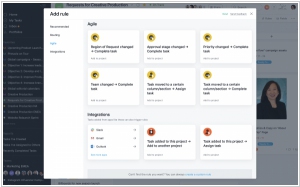
Work management platform Asana has introduced a new feature aimed at streamlining monotonous and repetitive tasks on its platform. Known as Asana Automation, this feature empowers users to create customized "if this then that" rules. To enhance user convenience, the rule builder includes over 70 pre-built and preset rules, while also allowing users to create their own personalized rules. With Asana Automation, customers can automate task routing to specific team members, among other functionalities. Additionally, the updated version incorporates a voice transcription service, an OCR tool, and intelligent smart templates that leverage the platform's machine learning capabilities.
2019. Google Drive added workflow integrations with DocuSign, K2 and Nintex
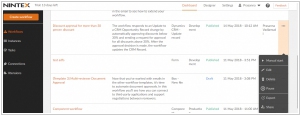
Google has recently announced several new workflow integrations for its Drive file storage service, enabling support for select features from DocuSign, K2, and Nintex process automation platforms. With the DocuSign integration, users can now conveniently prepare, sign, and store documents directly within Google Drive. Moreover, it allows for triggering actions such as billing, account activation, and payments upon agreement completion. The K2 integration takes a different approach by leveraging the power of machine learning tools. Users can train models on a workflow using Google's machine learning tools, enabling automated decisions such as loan approval or denial. All relevant information regarding these requests and approval processes is stored in a Google Sheet. Additionally, this integration facilitates simpler discovery of numerous documents within Drive, catering to more everyday use cases.
2019. Okta acquired workflow automation startup Azuqua
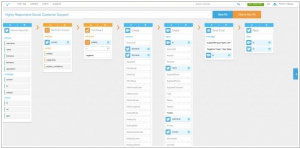
Okta has announced its acquisition of Azuqua, a workflow automation startup, for a sum of $52.5 million. In today's dynamic enterprise environment, employees and tasks frequently transition across various applications and services. The integration of automation software with identity and access management presents an opportunity to facilitate seamless movement between these entities. By combining their capabilities, the two companies aim to enable smooth application transitions within complex workflows, reducing the need for repetitive credential input. Product teams will have the ability to incorporate this technology into their own applications, alongside Okta's core authentication and user management tools, in order to create cohesive and integrated customer experiences.
2019. Google Docs gets an API for task automation
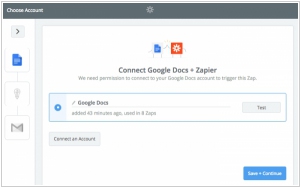
Google has introduced a new API for Google Docs, granting developers the capability to automate numerous tasks that users traditionally perform manually within the company's web-based office suite. The REST API is specifically designed to aid developers in creating workflow automation services for their users, developing content management systems, and generating documents in large quantities. With the API, developers can establish processes that manipulate documents retrospectively, enabling updates and changes. Additionally, the API provides functionalities such as inserting, deleting, moving, merging, and formatting text, as well as inserting inline images and working with lists, among various other features. This new API opens up a wealth of possibilities for developers to enhance productivity and streamline document-related workflows within Google Docs.
2018. Box acquired workflow automation startup Progressly
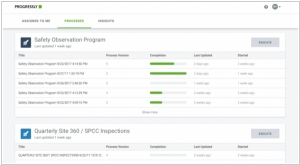
Box has recently acquired Progressly, a startup specializing in workflow management. In 2016, Box introduced its own workflow tool called Box Relay, in collaboration with IBM, targeting large enterprises. While Box Relay has proven valuable for well-defined processes within companies, such as contract management or employee onboarding, Box aims to expand its capabilities and create a wider range of workflows. The addition of the Progressly team to Box's workforce will facilitate this expansion. With their expertise, Box will be able to develop workflows that not only operate within the Box platform but also integrate with external workflow engines like Pega and Nintex. This integration will enable the creation of more complex automation scenarios using the comprehensive suite of Box tools and services. Such workflows can involve both internal employees and external organizations, allowing for sophisticated content movement and management beyond the capabilities of Box Relay.
2015. Project management service Workfront raised $33 million
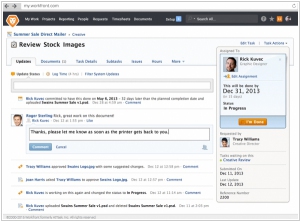
Project management solution Workfront (formerly known as AtTask) has recently announced securing a significant $33 million in Series E funding. While Workfront primarily targets marketing, IT, and services teams in its marketing efforts, its solution is not limited to these specific teams. The platform offers a comprehensive range of services, including basic project and task management, advanced workflow automation, approval processes, document management, and proofing tools. Prominent organizations such as Cisco, Comcast, Trek, and Cars.com are among Workfront's esteemed clientele. Workfront stands out by providing robust enterprise tools, distinguishing itself from some of its competitors. However, it operates within a highly competitive market that features well-funded emerging players like Asana and established companies like Atlassian. Notably, Atlassian's project management tools have gained significant traction beyond its traditional developer-centric market.
2009. CenterStage launched Sharepoint alternative for Documentum users

CenterStage is a collaboration solution introduced by EMC last year alongside the new version of Documentum. Initially, only the light version called CenterStage Essentials, which offers basic collaboration tools, was unveiled. However, the full-featured version, CenterStage Pro, is now available. CenterStage Pro boasts various Web 2.0 tools such as personal workspaces, a powerful search engine, wikis, blogs, and more, making it comparable to Microsoft SharePoint. One notable advantage of CenterStage is its ability to manage version history for not only documents but also other types of records such as blog posts, wiki pages, and discussions. However, it does lack workflow automation and metadata support when compared to SharePoint. It's important to note that CenterStage cannot be seen as a standalone competitor to SharePoint since it relies on integration with the Documentum ECM platform. Nevertheless, for companies already utilizing Documentum but haven't implemented SharePoint, CenterStage proves to be an appealing solution.

